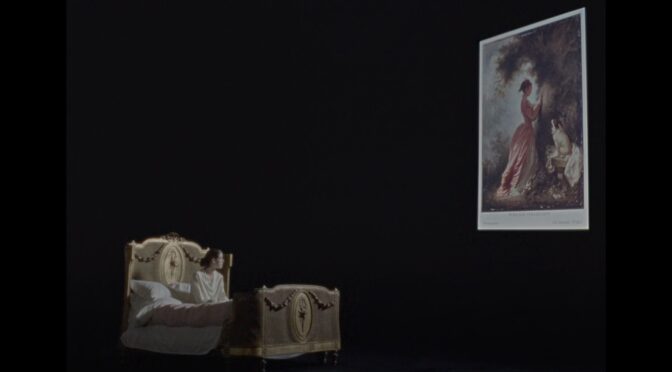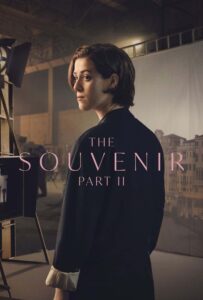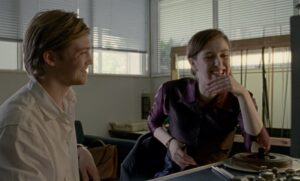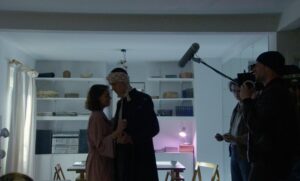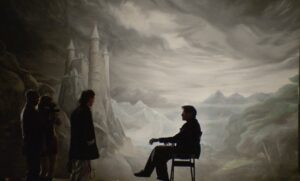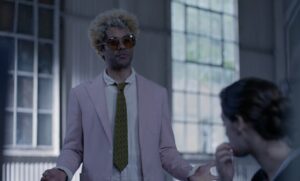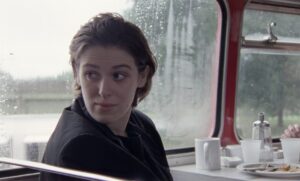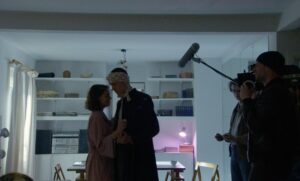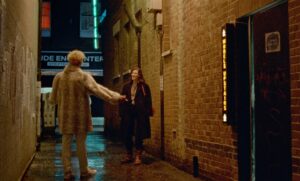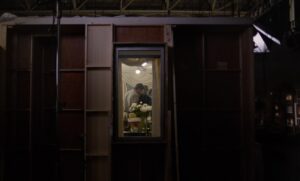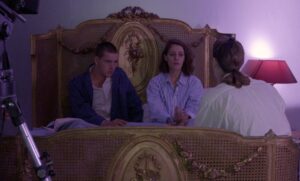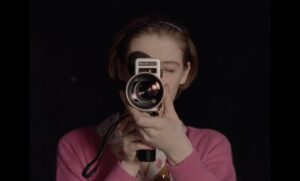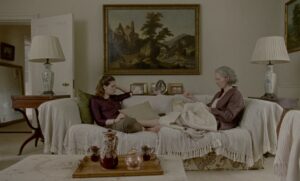Films, they say, are made in the editing room. With due respect to all the crafts, the editor has the most comprehensively vital and perhaps difficult role of them all. The editor is the shortstop of the cinema world and all of the action has a way of inevitably going right through (and hopefully not past) them. When all the actors and craftspeople and even the director herself have done their jobs, it is the editor who sits in a little room with all the raw material that will become the film and painstakingly trims and assembles it until it is at last a finished motion picture. When they do it well (like pretty much any film edited by Martin Scorsese’s lifelong secret weapon, Thelma Schoonmaker) they can single-handedly make a film work. When they do it badly, you end up with Bohemian Rhapsody. In one scene from Joanna Hogg’s The Souvenir: Part II, her marvelous sequel to her masterful 2019 addiction drama, she gives a splendid, subtle salute to the value of the editor. Our heroine, Julie, is deeply mired in grief over the recent overdose of her toxic beau and she is just as bogged down in the ordeal of turning that traumatic relationship into a film for her graduate thesis. Things are going far from swimmingly. Her actors find the characters (based on Julie and her late junkie boyfriend Anthony) confusing and psychologically opaque. Her cinematographer keeps taking her to task in front of everyone for not providing a coherent enough shooting schedule. Her professors have little faith in her project and openly express doubts that she will even graduate on time. And then the handsome, suavely modest editor enters the picture and some small bit of gloom (though by no means all of it) dissipates. Enough for Julie to maybe see a path forward. He sweetly gives Julie new confidence in the movie she is making. He raises a beer with her and reminds her that there is something here after all, even if nobody can quite see it yet. The fog of filmmaking may be think but you just have to believe it will all come together. And “It’ll all come together” is engraved somewhere on the crest of every editor ever. Of all the small, two-scene performances in her film, what a sweet stroke of genius for Hogg to make this editor the most soothing, affable presence of all. Because that’s exactly the kind of calming, centering effect a great editor has for a filmmaker (and in this case, a human being in mourning as well). Even when you feel completely lost as a filmmaker and everything feels like it’s bearing down on you, the editor calms your nerves and assures you that it’s all going to be okay in the end. If there’s a film somewhere in all of this footage, they will find it for you. No wonder Julie tries to make a pass at the charismatic bloke. Who doesn’t go a little weak at the knees for an editor? Thelma Swoon-maker, am I right?
Joanna Hogg’s exquisite second chapter in her The Souvenir saga follows where the almost equally exquisite first film left off (a top 10 finisher in my 2019 list). Julie, a well-off British film student has just lost her deceptive, heroin-abusing older boyfriend Anthony, the first and heretofore only love of her life, in the most wrenching way possible. And, while it will probably be better for Julie in the long run (as she very clearly never would have left him), that long run still feels a great distance away. Julie (rapturously and tenderly played by Honor Swinton Byrne, who I expect won’t need to be introduced as Tilda Swinton’s daughter much longer) is absolutely shell-shocked and visibly depleted. The tragedy she is weathering unfortunately does not change the fact that graduation is mere months away and she needs to cast and direct a new film for her final project. In the 2019 Souvenir, Julie was struggling with how to come up with an idea for a movie when her age and privileged background had yet to give her much interesting life experience. Julie no longer has that difficulty to reckon with. She decides to tell the story of her first painful, intoxicating, debilitating brush with love; to seek some solace or catharsis for her heartbreak and complete her sophomore film in one swoop. Because this story is Joanna Hogg’s own autobiography, her surrogate is essentially making the first Souvenir film, though unlike Hogg, she is choosing to make that story at the beginning of her career and with a more avant-garde sensibility. Julie learns, perhaps unsurprisingly, that directing a film from the bottomless pit of bereavement and post-traumatic shock is not easy. Less so when you are choosing to make your film about the very source of your trauma. And even less when you never grasped that trauma very clearly while you were in the middle of the relationship. The Souvenir: Part II is about the nexus between trauma and art and what kind of therapeutic role art should play for its creator and its audience. It is a film about art’s proximity to truth and how clearly or unclearly a work of art should present the world.
2022 was the first year that really felt post-COVID to me. That’s not to say COVID is remotely done with us, but 2022 felt like a bit of an exhale, a time to come to terms with the immense loss of the past two years. Among its treasures, the year saw a number of great works about processing grief, COVID-related (Bo Burnham: Inside) or not (Drive My Car, C’mon C’mon). The Souvenir: Part II is truly special in that regard. Joanna Hogg’s stunning achievement is a work that bathes in the currents of grief. It is a painting of grief by someone who has spent real time gazing at the subject. Hogg gives us grieving as a many splendored thing. She is sensitive not just to its tears and pain but to its fatigue, its waves of guilt and relief and anxiousness to put the worst behind you. A film about a young woman coming to terms with a terrible tragedy and feeling gutted about it probably sounds about as pleasant as watching a movie about a woman hopelessly in love with a tyrannically moody, thieving heroin addict. But neither of Hogg’s twin masterpieces are punishing wallows, bruising as they can be. They are both elevated out of exploitative despair by the very thing that inspired Hogg (and Julie in the story) to make them: curiosity. Hogg and Julie are stimulated by their trauma in a way that almost feels perversely humorous. Even one of the worst experiences a person can go through cannot pummel the observance out of them. Julie spent the first twenty years of her life with no unique stories to tell and then she stumbled into a veritable doozy. It’s a shame she had to suffer immensely to get it, but now she has something real and alive she can tap into. She has been forged by fire into a proper story-teller and there is a strange empowerment in that fact that Hogg is eager to wrestle with. All Julie has to do now to make her first great work is relive the same excruciating suffering all over again. All in a day’s work and so on. The Souvenir: Part II is about trying to wrap enough of your mind around your own trauma to tell the story of it in the first place. Grief is disorienting by its very nature. “It’s not linear,” says a vainly grandstanding fellow film student (Richard Ayaoade in what may be the year’s most perfect true supporting performance). But he is not referring to grief. He is talking about what it is to make a movie.
Like her protagonist in mourning, Joanna Hogg is marrying the grieving process to the filmmaking process. She is laying them on top of one another like transparencies (though transparent is the last word I would use to describe Hogg’s subtly woozy direction) and marveling at the parallels. The way both sometimes involve having to move backwards to move forwards. The tedium and the uncertainty and the lost sleep and the claustrophobic pressure. The way it sometimes feels like you’ll never be done with them, that you’ll just be wandering the labyrinth forever. And Julie’s relationships to her student collaborators reveal things about grief to us and to her. Her sweetly calm editor gives her a soft shoulder and a listening ear the same way an editor helps ground the chaotic fragments of a film and calm a director. Her actors, on the other hand, create stress for her by wanting to dig into their characters, which gives Julie the daunting challenge of explaining Anthony and that version of herself and the relationship and all the maddening decisions she made in the first film. To give them a chance to play their parts well, Julie must step back and publicly dissect herself. Her cinematographer likewise wants clarity, the very thing Julie most fears. And yet, by choosing to make the film, she is forcing her own hand; forcing herself to grieve in a more honest and lucid way. By telling her crew the story, she is reluctantly telling herself the story in a way she was unable to process before. In shooting a scene where Anthony is hiding in the bathroom in the depths of a heroin binge, Julie drives her camera crew crazy by insisting they only shoot outside of the slightly ajar bathroom door. She only wants to shoot what she really saw and what she knew about. And that just begs the most unnerving question of all: how much did you see? How much did you know? The Souvenir: Part II is about grieving but it is also about making some sense out of the aftermath of staggering heartbreak. And the challenge of film is that what you may take for granted as making sense in your own mind must now make sense to others too. And when Julie starts to see how elements of her painful past year don’t add up, she must account for that.
Joanna Hogg portrays the film-making process as a maddening game of telephone. You may start with some reasonably clear vision in your head (if you’re lucky anyway), but that is only the beginning. You must then explain what is in your head to a whole team of others who are not automatically privy to the contents of your brain. You must, in effect, describe a dream. And you well know how deceptively slippery that can be. In how it approaches both self-deception and the making of art, The Souvenir: Part II is about wanting to see the truth clearly and realizing how far you have to go to do that. It is the story of a young woman trying to make honest art out of an ordeal that was marked by deceit and denial. The only way for Julie to honestly tell the first Souvenir‘s story is to confront the shameful fact that she lied to herself, kept truths concealed from herself just as Anthony hid things from her. Debased herself with the lows of what she was willing to accept in exchange for being loved. She spent months and months at the bottom of the sea. Months in the stranglehold of something terrible and hypnotic that she could only survive by shielding her eyes from it. But now she must do what artists do and try to look at the truth dead on. How one looks at truth is a question at the very heart of art and there is no set way to go about it. But I think there’s a fateful step the artist must make toward wanting to tell the truth at all. At some point, the artist must look inward and utter the words Julie speaks in her film. “I do want to know.”
As with the first film, Hogg makes achingly powerful use of the real-life mother-daughter bond between Honor Swinton-Byrne and Tilda Swinton. In taking the story past the first film’s devastating climax, it continues to be a powerful and complex tale about parenting. Or maybe it is more accurately about not parenting; not parenting too much anyway. I think Tilda Swinton could knock this role out of the park even without her own daughter suffering and imploding across from her, but the real history and maternal concern she must feel leaps off the screen with barely a flick of Tilda’s wrist. And I choose to believe Hogg’s canny casting is achieving its exact intention. Because this isn’t the kind of tragedy where the mother calls attention to herself or bursts into sobs or fights with her struggling child. Though Tilda Swinton’s performance is demurely towering, it is the exact opposite of a histrionic Oscar performance. Quiet, constant support is the key to this look at motherhood and what it feels like to watch your own child experience an ordeal almost too harrowing to imagine. It gets back to the idea that both of Hogg’s films are about how every human being must make their own mistakes and maybe even walk themselves right into irreversible heartbreak. Because our choices make us, so we must all be allowed to make those choices for ourselves. It is that powerful, unspoken truth that crackles at the heart of Tilda Swinton’s perfect work in both films. The Souvenir: Part II is Julie’s story, her epic and intimate coming of age odyssey. Her coming of artistry too. And it is just a little bit her mother’s story too in a perfectly judged kind of way. It is quietly about a woman who watches her child nearly waste away and then sees her get saved but only through the bizarre grace of a trauma that will remain inside her like a piece of shrapnel for the rest of her days. It is about the anguish of not doing more to stop that, while also knowing that taking steps to stop it would have done even greater harm. It is about this woman’s own choice to support her daughter but without getting in the way of things her child had to go through and process on her own. We cannot live on our loved one’s behalf. We cannot take over the making of their film. Like an editor, a good mother is there to listen and talk and help her children piece hard-won wisdom together. But they must gather the pieces on their own.
